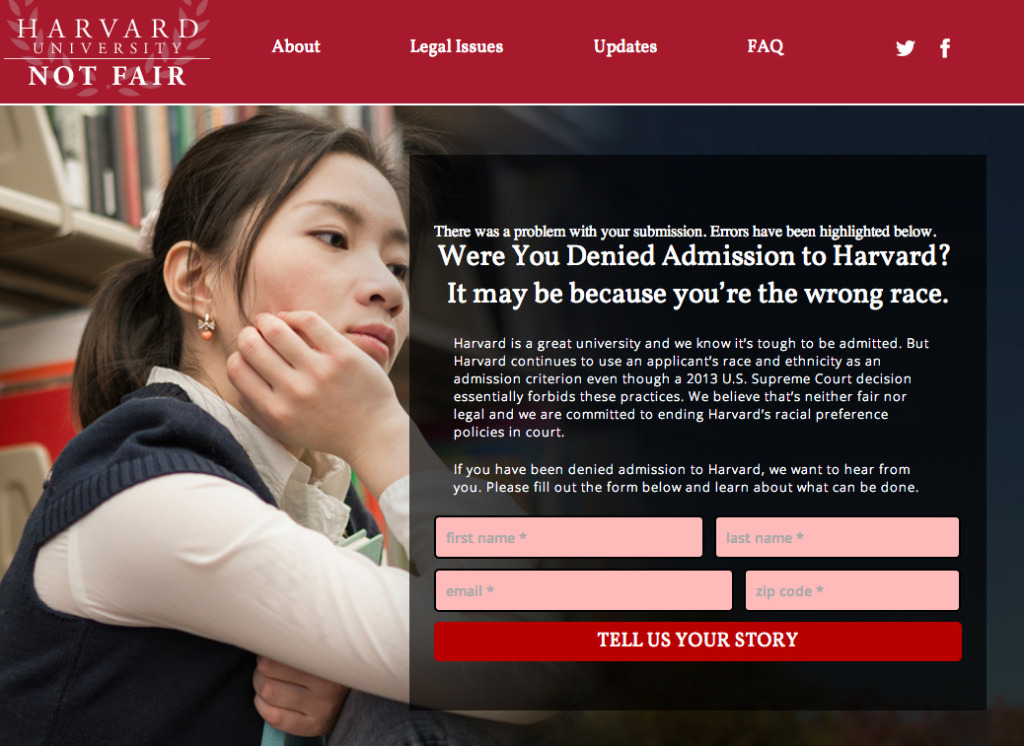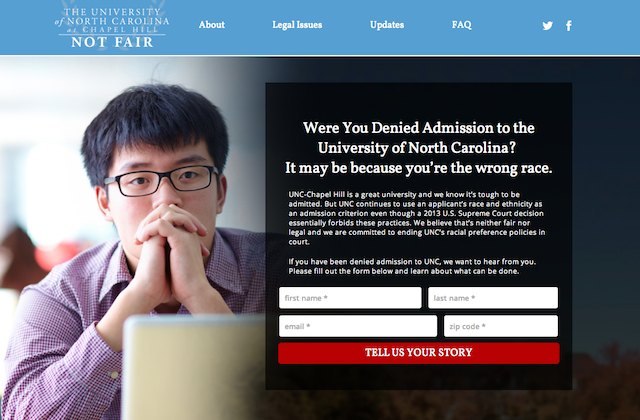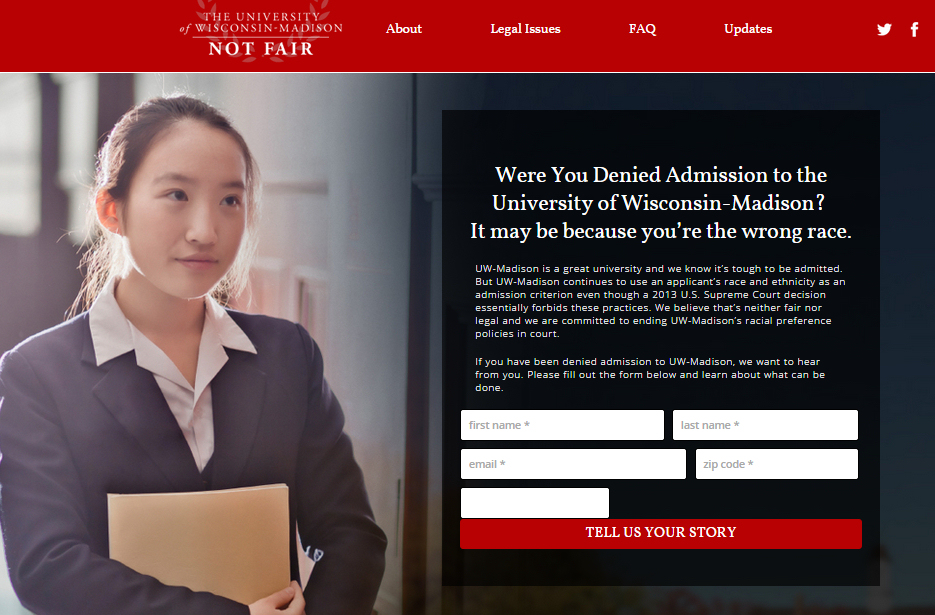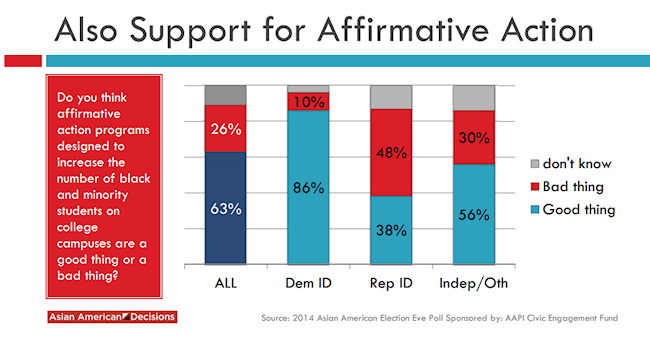
On Monday, a newly formed group called Students for Fair Admissions which was created by Edward Blum — a Republican on a one-man mission to end affirmative action in university admissions, and the man behind the Fisher case — filed two new lawsuits against two of the nation’s elite universities. The lawsuits come after over a year of Edward Blum canvassing for “just the right Asian”: rejected applicants to Harvard, Univeristy of North Carolina – Chapel Hill (UNC) and University of Wisconsin-Madison. Blum was looking for Asian Americans willing to become the new Abigail Fisher: someone willing to be exploited as the next public face of the affirmative action debate. The screen-caps in this post are from those microsites and make clear Blum’s racialized intent in making that new face an Asian American one.
Blum’s lawsuits, filed on behalf of an Asian and a White plaintiff respectively, assert that Harvard and the University of North Carolina – Chapel Hill employ discriminatory admissions practices in their affirmative action policies; in contrast to the Fisher case, these two suits argue that affirmative action policies constitute discrimination against both Asian American and White applicants.
The suit against Harvard University involves an Asian American applicant who presumably filled out the form above. The suit describes the applicant as having scored highly in GPA and standardized test scores, but was denied admission to Harvard. The suit then alleges that the reason for the student’s failure to receive admittance was because Harvard treats race as “a defining feature of [an] application”, which is not permitted under Supreme Court rulings.
Yet, the evidence for this assertion appears scant.

While the suit makes it clear that with regard to quantitative scores, the Asian American applicant generated a strong application to Harvard, the lawsuit largely fails to provide convincing evidence that the reason the applicant did not receive admittance is due predominantly to their race or ethnicity. Problematically, the lawsuit simply discounts the many other factors that are considered by college admissions officers in the holistic review process, including declared major, family income, legacy, and strength of reference letters and essay. The suit instead asserts an unspoken racial quota in the Harvard admissions process, while offering little definitive evidence that such a quota exists at Harvard or that it was the reason for the unnamed applicant’s rejection from the school. The conclusion that the unnamed applicant was rejected because of their race is largely conjecture, and based on the bizarre presumption that high standardized test scores entitles an applicant to admission to an elite university.
Meanwhile, the suit offers a clear description of Harvard’s admission process, which discusses a system where racial and ethnic information is considered non-determinatively with respect to campus diversity, a compelling interest that has already been affirmed by the Supreme Court. The lawsuit cites a brief submitted by Harvard in relation to the landmark Bakke case which describes the university’s admissions process in its own terms:
“In Harvard College admissions the Committee has not set target-quotas for the number of blacks, or of musicians, football players, physicists or Californians to be admitted in a given year. At the same time the Committee is aware that if Harvard College is to provide a truly heterogeneous environment that reflects the rich diversity of the United States, it cannot be provided without some attention to numbers.
… Consequently, when making its decisions, the Committee on Admissions is aware that there is some relationship between numbers and achieving the benefits to be derived from a diverse student body, and between numbers and providing a reasonable environment for those students admitted. But that awareness does not mean that the Committee sets a minimum number of blacks or of people from west of the Mississippi who are to be admitted. It means only that in choosing among thousands of applicants who are not only ‘admissible’ academically but have other strong qualities, the Committee, with a number of criteria in mind, pays some attention to distribution among many types and categories of students.”
In short, the Committee must think about the diversity of the incoming freshman class when considering the diversity of the incoming freshman class. Not exactly earth-shattering news.
It was this exact sort of limited consideration of race common at most colleges and universities that was ultimately ruled constitutional by the Supreme Court. Blum’s latest lawsuit offers no meaningfully novel evidence in regards to Harvard’s admission process to support its claim that “Harvard held Asian Americans to a higher standard than other applicants” resulting in racial discrimination — a claim that the lawsuit admits was not supported by a study conducted by the Office for Civil Rights in 1990. Instead, the lawsuit cites the same problematic datasets that are quoted over and over again by anti-affirmative action advocates — the frequently misinterpreted findings of Thomas Espenshade and the scientifically debunked Mismatch Theory of Richard Sander — to bolster its assertions. These arguments are wanting.
Consequently, it’s difficult to imagine how this lawsuit will be successful, given the ample legal history already established surrounding the affirmative action debate.

What is more galling, however, is Blum’s overt co-optation of the Asian American community to advance a conservative partisan goal of deprioritizing campus diversity and educational access for students of colour. There is no better example of the Asian American racial identity being exploited by mainstream politics to serve as a wedge for the purposes of advancing a conservative agenda: one that seeks to reinforce anti-Blackness and to marginalize people of colour through selective perpetuation of the Model Minority Myth; and here too the same problems with buoying up the Model Minority Myth applies.
Again, the Myth reduces us to a monolithic mass of East and South Asian achievement, washing away the diasporic diversity of AAPIs. Lost are the many underrepresented AAPIs who must endure extraordinary gaps in income and educational opportunity, and who might also benefit from race-conscious affirmative action policies. Again the Model Minority Myth ties Asian American-ness with scholastic and economic achievement, blurring away the psychological costs of the anxiety-inducing contention that the racially authentic Asian must be the successful Asian.
Blum purports to speak for the Asian American community in the filing of his lawsuit. He purports to stand in defense of the Asian American community against institutional racism from elite universities. Blum forgets that a majority of Asian Americans simply do not stand with Blum.
Multiple studies have now shown that over 60% of AAPIs support affirmative action in college admissions. A recent election eve poll conducted by Asian American Decisions in the days leading up to the 2014 midterms confirmed earlier findings by the National Asian American Survey and other statewide polls in showing that 86% of registered AAPI Democrats and 56% of independent AAPIs support affirmative action in the college admissions process.
 At UNC, which faces a similar lawsuit as the one filed against Harvard (except in the case of that suit, the unnamed applicant is White), Asian American students are already taking a stand against Edward Blum, asking him not to speak for them. The UNC Asian American Students Association issued the following statement:
At UNC, which faces a similar lawsuit as the one filed against Harvard (except in the case of that suit, the unnamed applicant is White), Asian American students are already taking a stand against Edward Blum, asking him not to speak for them. The UNC Asian American Students Association issued the following statement:
UNC Asian Students Association does not support Students for Fair Admissions’ claims that applicants are being denied admission to the university on the basis of race. UNC ASA favors admission policies that ensure diversity, which is integral for the learning experience on college campuses, and recognizes that any admissions process is multi-faceted with no exact science. Additionally, the filing fails to present a holistic portrayal of UNC’s Asian student community, which is comprised of diverse ethnicities and spanning an array of socio-economic backgrounds. To paint the picture that Asians are being denied admission into UNC due to racial discrimination is to use our community as a shield to promote an already privileged position.
There are areas for improvement in UNC’s recruitment efforts for minority students, but we recognize that Asians and Asian Americans are well-represented on UNC’s campus when compared with the overall population of Asians in the state. With one of the fastest-growing populations in the United States and within North Carolina, we are seeing the representation of Asians and Asian Americans likewise growing quickly at UNC, with 15% of the admitted Fall 2014 class identifying as Asian. And while we believe that racial diversity at UNC is still an issue that has not been adequately addressed, we appreciate the ongoing efforts of our university to work towards a more complete student body representative of the people the university was built to serve.
To accuse any university of denying any qualified student on the basis of race alone is likely far-fetched, given that many extremely qualified students are denied admission to prestigious universities on a yearly basis. That being said, UNC ASA would like to join with our fellow minority student groups in an open dialogue with the appropriate university administration to guarantee transparent and fair admissions practices. UNC ASA supports the university’s ongoing commitment to creating a more diverse campus and look forward to broadening the conversation on minority student recruitment, admission, and retention.
To read the formal complaint, click here.
I, too, refuse to be Edward Blum’s racial wedge.
Over the next few weeks, AAPI groups will hopefully begin speaking out against Blum’s exploitation of the AAPI politic to advance his own conservative agenda. I hope you will stand with me — and the many other Asian Americans who support higher ed access and educational justice for all — in challenging Blum’s blanket usurpation of our identity with simultaneous erasure of our narratives.
Act Now: Please sign 18MillionRising’s petition here: Edward Blum, We Won’t Be Used For Your Racist Agenda!

